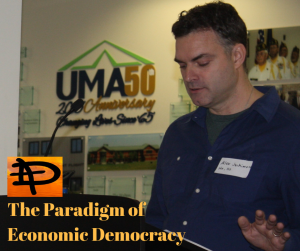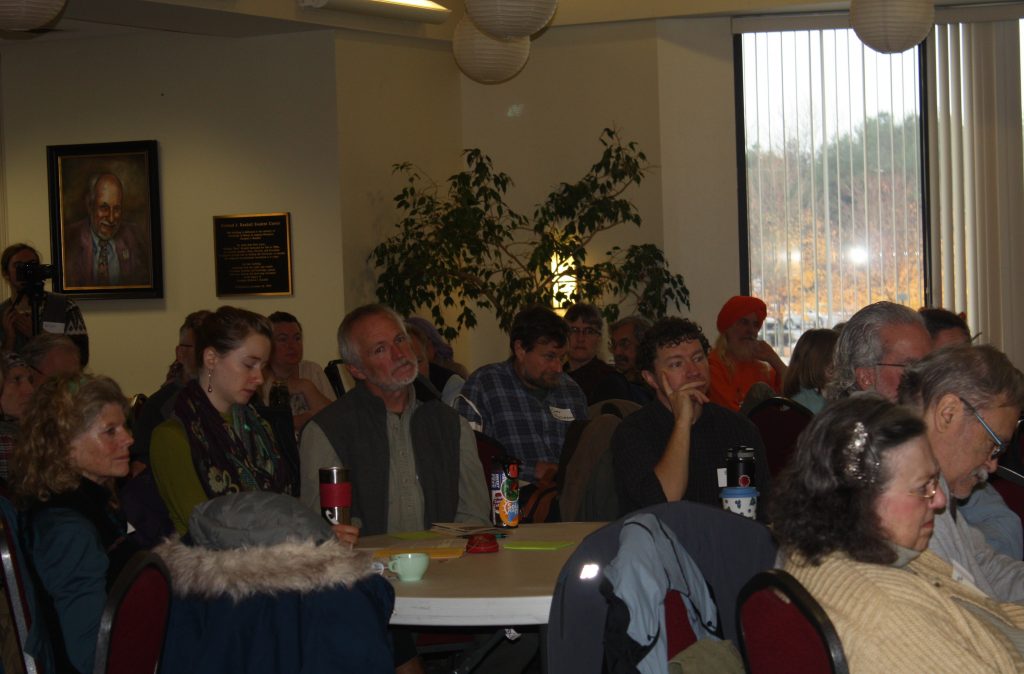A landmark conference on Economic Democracy took place at the University of Maine in Augusta on November 10, 2018. Two Proutists, Alex Jackimovicz and Ashrita Shri Verrill formed the Alliance for Economic Democracy (www.aedmaine.org) two years ago that organized this event with 27 co-sponsors. The theme was “Our Community, Our Economy: Economic Democracy for Maine.” Seventy people participated in the all-day program with keynote talks and workshops about cooperatives, the biopsychology of cooperation, healthcare, decentralized energy, food sovereignty, financing economic democracy, indigenous rights, fair trade, cooperative housing and land care, ecology-based economy and timebanking.
Transcript of the keynote address by Alex Jackimovicz
 The Paradigm of Economic Democracy
The Paradigm of Economic Democracy
Thank you all for coming today, it’s a privilege and honor to speak to you. I want to acknowledge who I see in the room today: Practitioners of the new economy, representatives of people’s movements—healthcare, food sovereignty, decentralized energy generation, cooperatives; all of you deeply committed to community values, and to a more just and sustainable world. Some of you serve at the intersection of social and economic justice activism and the new economy. You all, and your work inspire me very much. We’re all here to share collectively, to discuss what Economic Democracy is, and how we can apply it.
Let me say a few things about myself. I live and work in Boothbay; I’m an electrician. My passion is for meditation, yoga, and working toward a better world. Over the last six or seven years, I’ve focused on activism— primarily social and economic justice campaigns, and challenging free trade agreements.
Two years ago my partner Shri Verrill and I founded the Alliance for Economic Democracy, and my activism shifted to embrace the strategic goal of implementing systemic change in order to foster a better world for all people, for all beings.
This view of economic democracy is based on a reimagining of society as if everybody is connected. We are not in isolation from nature, or from each other. Instead, we are in intimate relationship with those beings we can see and those that we cannot, and with the natural world of which we are a part. The heart of the work for organizing around economic democracy is in strengthening our social and economic fabric, our bonds with each other. We seek greater connections between all peoples, to reduce the divisions, apathy, tension, conflict, and misunderstanding. In this view, our economy is an extension of our community, of our community values. The economy must be in alignment with our highest versions of those values. The move to center the needs, interests, and desires of local people, is based on the sense of universal family. We all have rights and needs, and it is neither acceptable nor tolerable that some accumulate so much wealth that others are deprived of their basic needs.
Economic democracy is a framework where communities and regions base decisions and policies upon collective needs, rather than maximizing private profit. The great crises of our times, such as looming environmental collapse, and vast extinction of species, cannot be surmounted by individual efforts alone. A shift of consciousness must happen for us to collectively move toward the ideals of a democratic economy. We must consider our relationship with others and ask ourselves: Where does our food come from? How are the animals treated? What are the effects on the soils and waters? Are the practices of farming and agriculture part of the problem, causing environmental degradation, destruction, and mass pollution? How can they be aligned with the renewable, regenerative economy? What types of products do we purchase? Are they part of the disposable, mass-waste producing, centralized economy? What are the working conditions and how fairly are the workers paid? What is the environmental impact of the distance supplies must travel to get to us? We need to take a real, honest look at the nature of global capitalism and how it produces such incredible environmental devastation. To overcome that we need to establish and strengthen regional economies to be more self-reliant and re-localized so that they no longer depend on food and supplies shipped from thousands of miles away. Most of our retail goods come from what must be called a slave-labor sweatshop economy of Asia. Within the borders of the United States, we have outlawed the worst of such harsh, exploitative conditions—which merely exported the problem elsewhere—out of sight, and out of mind. We are taught to think it is rational and prudent to invest our money and retirement funds in the stock market with little thought of the impact that it has on community economies.
However, there are consequences for our ignorance.
The modern industrial economy is dominated by large transnational corporations and extremely high net worth individuals unconcerned with public health or the public good. Those entities focus exclusively on maximizing profits and wealth accumulation rather than paying good wages, strengthening local communities and economies, and thereby supporting strong and dynamic political processes. We should be looking at what is the effect of our actions on an entire eco-system of human economic, socio-political relationships. When we are developing our economies, it shouldn’t, and it doesn’t need to come at the expense of another’s opportunity to live and thrive. Neither should we be causing needless harm to the environment. This reimagining is a movement toward economic democracy It is the transformation of economic and political institutions as if people and the planet mattered, for the welfare of all. With a focus on real human needs, and bringing the power of decision-making back into the people’s hands. Economic Democracy is rooted in the notion that for the benefit of all people, and the planet, the economy must be democratized. What does it mean to bring the ideas of democracy to the economy? In essence, the word democracy means the rule of the demos—the rule of the people. What does an economy look like when it is of the people, by the people, for the people—without anyone left behind? A democracy is where the people collectively have real sovereignty, and the important decisions in society reflect their desires. I would argue that this is only possible with a system that guarantees a democratic economy. That is a system of economic democracy. That is what our convergence, this conference is about.
At the heart of it, there are four requirements or pillars essential to establishing economic democracy.
- The first is that all people have an economic and human right to have opportunities to live a dignified life. Necessities— food and water, shelter, healthcare, education, and clothing) must be guaranteed to all.
- The second pillar is to improve the standard of living and quality of life for everyone so that everyone has the means to meet their basic needs.
- The third pillar is that economic power must be in the hands of local people.For example, it should be the local people who determine the best use of local resources.
- Lastly, the fourth is using local resources to meet local needs and limiting the wealth leaving local economies.
These ideas represent a new paradigm of how the economy functions. Whatever economic production, labor, and markets can be local, should be local. These requirements or pillars of economic democracy demonstrate a new set of values, and they show us what we already know. Environmental destruction and poverty are completely unnecessary— We live in the most wealthy nation in the history of nations and we have so many who are struggling to just survive. Nearly half the nation has less than $400 in the bank! It doesn’t have to be like this, it shouldn’t be like this. There is a better way.
It is no surprise that the communities most economically, and socially oppressed are also the most disenfranchised. They are the people of color, indigenous people, minority and vulnerable populations, people at the margins of society who often have no voice in the decisions affecting their lives. Half of those who earn the minimum wage in Maine are people of color—and they make up less than 5 percent of the population of Maine. There are none for whom it is more important to have economic democracy than the most socially and economically impacted.
It feels to me like so much of this work is still in developing our community relations, our bonds, in being responsible for each other, in raising our voices, doing important work of self-reflection and understanding the needs and voices of others. Being quiet enough to listen and be in true solidarity with those voices. These are some of the necessary ingredients for us to come together. Maybe then we can move together and live up to the ideal that:
Economic Democracy is the radical and audacious idea that all the local stakeholders have a say in shaping “their” economy.It is the people who are most impacted who are must be empowered to make the critical decisions in their lives, especially the economic decisions. This is our community. This is our economy. We, the people, have some work to do to come together and establish justice and fairness with each other.
So what can this look like?
The democratic economy includes transition towns; regional food systems, sustainable and regenerative organic agriculture; community and municipally-owned and run decentralized renewable power generation; community development and investment institutions; the cooperative economy—including worker and consumer-owned cooperative enterprises; solidarity and local living economies; local credit unions, public banks; pro-worker, pro-wage, pro-family policies and campaigns; institutions which prioritize community and environment over profit.
Thank you for coming. It has been a great pleasure to speak before you.

